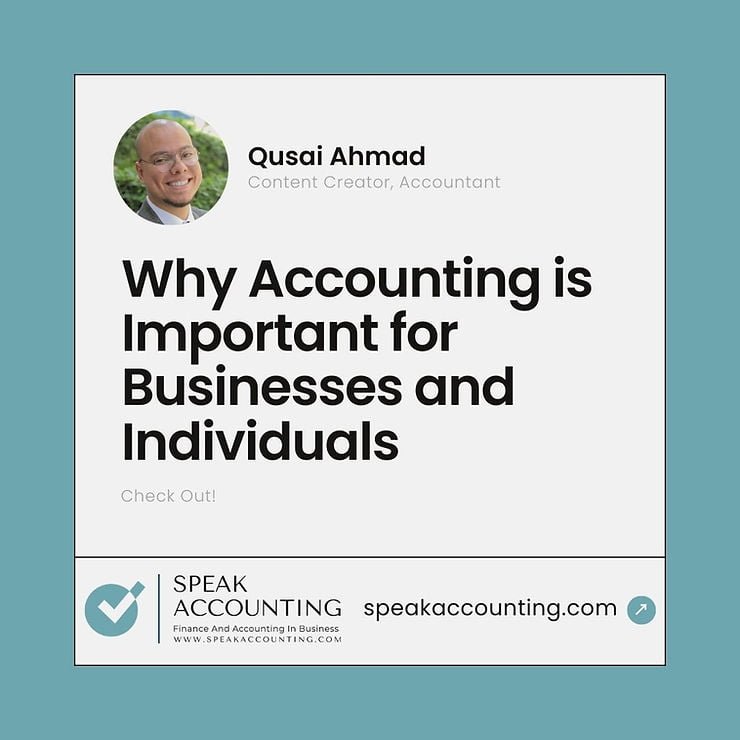Introduction – Why Accounting is Important for Businesses and Individuals
Accounting is the process of recording, summarizing, analyzing, and communicating financial information. Accounting plays a vital role in the functioning and success of any organization, whether it is a business, a non-profit, or a government entity. Accounting also helps individuals manage their finances and achieve their financial goals.
In this article, we will explore the importance and benefits of accounting for both businesses and individuals and discuss some of the main topics and issues related to accounting.
Accounting for Businesses
Businesses use accounting for various purposes, such as financial reporting, managerial accounting, and tax accounting. Each of these purposes has its objectives, methods, and users.
Financial Reporting
Financial reporting is the process of preparing and presenting financial statements that show the financial position, performance, and cash flows of a business. Financial statements include the balance sheet, the income statement, the statement of changes in equity, and the statement of cash flows. Financial reporting is important for both internal and external stakeholders of a business, such as managers, owners, investors, creditors, regulators, and the public. Financial reporting helps these stakeholders to:
- Evaluate the financial health and performance of a business
- Assess the risks and opportunities associated with a business
- Make informed decisions and judgments about a business
- Monitor and enforce the accountability and transparency of a business
Financial reporting is governed by various accounting standards and regulations, such as the Generally Accepted Accounting Principles (GAAP) in the United States, the International Financial Reporting Standards (IFRS) in most other countries, and the Sarbanes-Oxley Act (SOX) for public companies in the United States. These standards and regulations aim to ensure the quality and reliability of financial reporting, and to protect the interests and rights of the users of financial information.
Managerial Accounting
Managerial accounting is the process of providing and using accounting information for planning, controlling, and evaluating the operations of a business. Managerial accounting helps managers and other internal decision makers to:
- Set goals and objectives for a business
- Develop strategies and plans to achieve those goals and objectives
- Implement and monitor the execution of those strategies and plans
- Measure and evaluate the results and outcomes of those strategies and plans
- Take corrective and preventive actions to improve the performance and efficiency of a business
Managerial accounting relies on various accounting information systems and tools, such as cost accounting, budgeting, variance analysis, profitability analysis, break-even analysis, and balanced scorecard. These systems and tools help managers to collect, process, analyze, and report relevant and timely accounting information for decision making and performance measurement.
Tax Accounting
Tax accounting is the process of complying with tax laws and regulations, and minimizing tax liabilities and maximizing tax benefits for a business. Tax accounting helps businesses to:
- Calculate and report their taxable income and tax expenses
- File and pay their tax returns and obligations
- Claim and utilize their tax deductions and credits
- Plan and implement their tax strategies and policies
- Deal with tax audits and disputes
Tax accounting is influenced by various tax laws and regulations, such as the Internal Revenue Code (IRC) in the United States, the Value Added Tax (VAT) in most other countries, and the Tax Cuts and Jobs Act (TCJA) for businesses in the United States. These laws and regulations determine the tax rules and rates for different types of businesses, income, expenses, and transactions. Tax accounting also involves the assistance and guidance of tax professionals and advisors, such as certified public accountants (CPAs), enrolled agents (EAs), and tax attorneys. These professionals and advisors help businesses with tax accounting, planning, and compliance.
Accounting for Individuals
Individuals use accounting for various purposes, such as personal finance, financial literacy, and tax accounting. Each of these purposes has its own objectives, methods, and users.
Personal Finance
Personal finance is the process of managing one’s income and expenses, and achieving one’s financial goals and security. Personal finance helps individuals to:
- Track and monitor their income and expenses
- Save and invest their money for the future
- Manage and reduce their debt and liabilities
- Protect and insure their assets and income
- Plan and prepare for their retirement and estate
Personal finance involves various aspects of budgeting, saving, investing, and debt management. Budgeting is the process of creating and following a plan for one’s income and expenses. Saving is the process of setting aside a portion of one’s income for future use.
Investing is the process of allocating one’s money to different types of assets, such as stocks, bonds, mutual funds, and real estate, to earn a return. Debt management is the process of borrowing and repaying money, such as loans, mortgages, and credit cards, to finance one’s needs and wants.
Financial Literacy
Financial literacy is the process of understanding and interpreting financial information, and making informed and responsible financial decisions. Financial literacy helps individuals to:
- Evaluate the costs and benefits of different financial options and alternatives
- Assess the risks and rewards of different financial opportunities and choices
- Make sound and rational financial judgments and actions
- Avoid and overcome financial problems and challenges
- Achieve and maintain financial well-being and stability
Financial literacy is influenced by various factors, such as education, experience, personality, and environment. Financial literacy can be enhanced by various sources of financial education and resources, such as books, courses, websites, podcasts, blogs, and advisors. These sources of financial education and resources help individuals to learn and improve their financial knowledge, skills, and habits.
Tax Accounting
Tax accounting is the process of complying with tax laws and regulations, and minimizing tax liabilities and maximizing tax benefits for an individual. Tax accounting helps individuals to:
- Calculate and report their taxable income and tax expenses
- File and pay their tax returns and obligations
- Claim and utilize their tax deductions and credits
- Plan and implement their tax strategies and policies
- Deal with tax audits and disputes
Tax accounting is influenced by various tax laws and regulations, such as the Internal Revenue Code (IRC) in the United States, the Value Added Tax (VAT) in most other countries, and the Tax Cuts and Jobs Act (TCJA) for individuals in the United States. These laws and regulations determine the tax rules and rates for different types of income, expenses, and transactions.
Tax accounting also involves the assistance and guidance of tax professionals and advisors, such as certified public accountants (CPAs), enrolled agents (EAs), and tax attorneys. These professionals and advisors help individuals with tax accounting, planning, and compliance.
Conclusion
Accounting is important for both businesses and individuals, as it helps them to manage their financial affairs and achieve their financial goals. Accounting provides valuable information and insights for various purposes, such as financial reporting, managerial accounting, tax accounting, personal finance, and financial literacy. Accounting also helps to ensure the quality, reliability, and transparency of financial information, and to protect the interests and rights of the users of financial information. Accounting is a dynamic and evolving field, as it adapts to the changing needs and expectations of the society and the economy.
If you are interested in learning more about accounting, or need help with your accounting needs, you can explore some of the following resources and suggestions:
- For businesses, you can consult with a professional accountant, auditor, or tax advisor, who can provide you with expert advice and assistance on your accounting matters. You can also use various accounting software and applications, such as QuickBooks, Xero, or FreshBooks, which can help you with your accounting tasks and processes.
- For individuals, you can enroll in a financial literacy course, or read a financial literacy book, which can help you to improve your financial knowledge and skills. You can also use various personal finance tools and apps, such as Mint, YNAB, or Personal Capital, which can help you with your budget.
Share this content:




